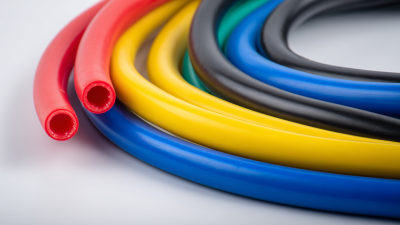In today's rapidly evolving industrial landscape, the demand for versatile and resilient materials has never been greater. According to a recent report by Grand View Research, the global silicone market is projected to reach USD 27.5 billion by 2025, driven largely by innovations in silicone products such as the
Flexible Silicone Hose. These hoses are not only renowned for their high-temperature resistance and flexibility but also for their durability in extreme environments. As industries strive for efficiency and reliability, the ability of Flexible Silicone Hose to withstand various chemicals and maintain performance under pressure makes it an essential choice for modern applications. This unique combination of properties positions Flexible Silicone Hose as a critical component across sectors, from automotive to chemical processing, thereby enabling enhanced productivity and safety standards.

Flexible silicone hoses have become a crucial component across various modern applications due to their unique properties. One of the standout characteristics of silicone is its remarkable temperature resistance. These hoses can withstand extreme temperatures ranging from -60°C to 200°C, making them ideal for industries like automotive, food and beverage, and pharmaceuticals, where temperature regulation is critical.
In addition to temperature resilience, flexible silicone hoses exhibit excellent flexibility and durability. They are designed to bend and twist without compromising the integrity of their structure, allowing for versatile installation options. This flexibility makes them suitable for tight spaces and complex configurations, reducing installation time and enhancing overall efficiency. Moreover, silicone is chemically inert, resisting corrosion and degradation from various substances, which ensures a longer lifespan and reliability in demanding environments. These features combined make flexible silicone hoses an essential choice for businesses looking to optimize their operations while ensuring safety and performance.
When considering hose materials, traditional options often present a range of challenges that can hinder efficiency and performance in modern applications. One prominent issue is rigidity. Traditional hoses, often made from rubber or metal, can be inflexible and difficult to maneuver, leading to potential kinks or breaks under pressure. This rigidity restricts versatility, making it hard to adapt to intricate designs or tight spaces commonly encountered in contemporary machinery and automotive systems.
Furthermore, traditional materials are often susceptible to chemical reactions, heat degradation, and environmental factors. Rubber hoses, for instance, can deteriorate when exposed to certain chemicals, resulting in leaks and costly downtime. In contrast, flexible silicone hoses are engineered to withstand a broader range of temperatures and are more resistant to chemical corrosion. As industries evolve and demand greater durability and flexibility, the drawbacks of traditional hose materials become increasingly apparent, underscoring the need for innovative solutions that meet the challenges of modern technology.

Silicone hoses have increasingly become a go-to choice across various modern applications, owing to their remarkable properties that set them apart from traditional hose materials. One of the standout advantages is their temperature resistance; silicone can withstand extreme heat and cold, making it ideal for automotive, aerospace, and industrial uses. Unlike rubber or PVC hoses, which can degrade or lose flexibility over time, silicone maintains its integrity even under harsh conditions, ensuring reliable performance and longevity.
Another significant advantage of silicone hoses is their flexibility and ease of installation. They can be molded into complex shapes and sizes, allowing for custom solutions that fit specific design requirements. This flexibility not only simplifies the installation process but also accommodates vibrations and movements in systems, reducing the risk of damage. Moreover, silicone hoses are often chemically resistant, making them suitable for a wide variety of fluids without the risk of corrosion. This combination of durability, adaptability, and resistance to extremes makes silicone hoses an essential choice for contemporary applications, standing out in a crowded field of materials.
Flexible silicone hoses have become an essential component across various modern applications due to their unique properties and versatility. These hoses excel in environments requiring high heat resistance and flexibility, making them ideal for industries such as agriculture, where soft robotic systems are increasingly utilized. Research indicates that the demand for soft actuators, which can mimic human-like movements, has grown significantly, with projections estimating an annual growth rate of over 25% in the agricultural robotics field alone.
In the realm of biomedical applications, flexible silicone hoses are also indispensable. They are used in devices that require high levels of precision and reliability, such as in soft pneumatic actuators that grip and manipulate objects delicately. The flexibility and biocompatibility of silicone enable these devices to operate efficiently in sensitive environments, supporting advancements in healthcare technology.
**Tips:** When selecting a flexible silicone hose for your application, consider factors such as temperature resistance and chemical compatibility. It's essential to understand the specific requirements of your industry to ensure optimal performance and longevity. Additionally, regular maintenance and inspection can help prevent unexpected failures and improve the lifespan of silicone components in critical applications.
| Application Area | Advantages | Temperature Resistance | Chemical Resistance | Common Uses |
|---|---|---|---|---|
| Automotive | High flexibility and durability | -60°C to +200°C | Good resistance to oils and fuels | Coolant hoses, turbocharger hoses |
| Medical Equipment | Non-toxic and biocompatible | -40°C to +150°C | Excellent resistance to sterilization processes | Breathing tubes, intravenous lines |
| Food and Beverage | FDA compliant and easy to clean | -50°C to +180°C | Good resistance to fats and sugars | Conveyor systems, processing hoses |
| Industrial Applications | Resilient to abrasion and weather conditions | -60°C to +260°C | Resistant to various chemicals | Chemical transfer, ventilation systems |
| Electronics | Excellent electrical insulation | -50°C to +180°C | Good resistance to moisture | Cabling and wiring protection |
The emergence of flexible silicone hoses has revolutionized various industries, yet challenges persist. One notable issue is the hose's susceptibility to temperature fluctuations, which can lead to expansion or contraction and compromise performance. To address this, manufacturers are now incorporating advanced materials that enhance thermal stability. These innovations not only maintain dimensional integrity under extreme conditions but also improve the overall lifespan of the hoses, making them a reliable choice for demanding applications.

Another challenge faced by silicone hoses is their vulnerability to abrasion and puncture. Innovative solutions, such as reinforcing silicone with specialized fibers or coatings, are being developed to enhance durability without sacrificing flexibility. These improvements ensure that hoses can withstand harsh environments, whether they are used in automotive, aerospace, or industrial contexts. As the technology behind flexible silicone hoses continues to evolve, these innovative solutions are paving the way for more resilient and efficient components that meet modern application demands.






